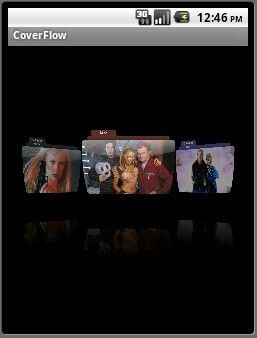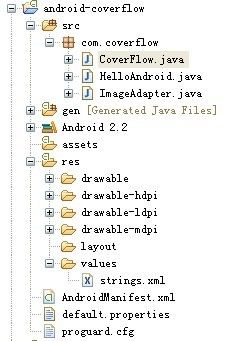CoverFlow
首先声明,源代码转载自国外Neil Davies,使用Apache2.0开源协议,请使用源代码的人自觉遵守协议内容。
效果图:
[img]

[/img]
使用过Android自带的gallery组件的人都知道,gallery实现的效果就是拖动浏览一组图片,相比iphone里也是用于拖动浏览图片的coverflow,显然逊色不少。实际上,可以通过扩展gallery,通过伪3D变换可以基本实现coverflow的效果。
要使用gallery,我们必须首先给其指定一个adapter。在这里,我们实现了一个自定义的ImageAdapter,为图片制作倒影效果。
传入参数为context和程序内drawable中的图片ID数组。之后调用其中的createReflectedImages()方法分别创造每一个图像的倒影效果,生成对应的ImageView数组,最后在getView()中返回。
仅仅实现了图片的倒影效果还不够,因为在coverflow中图片切换是有旋转和缩放效果的,而自带的gallery中并没有实现。因此,我们扩展自带的gallery,实现自己的galleryflow。在原gallery类中,提供了一个方法getChildStaticTransformation()以实现对图片的变换。我们通过覆写这个方法并在其中调用自定义的transformImageBitmap(“每个图片与gallery中心的距离”)方法,,即可实现每个图片做相应的旋转和缩放。其中使用了camera和matrix用于视图变换。
工程结构图:
[img]

[/img]
CoverFlow:
ImageAdapter:
HelloAndroid:
效果图:
[img]

[/img]
使用过Android自带的gallery组件的人都知道,gallery实现的效果就是拖动浏览一组图片,相比iphone里也是用于拖动浏览图片的coverflow,显然逊色不少。实际上,可以通过扩展gallery,通过伪3D变换可以基本实现coverflow的效果。
要使用gallery,我们必须首先给其指定一个adapter。在这里,我们实现了一个自定义的ImageAdapter,为图片制作倒影效果。
传入参数为context和程序内drawable中的图片ID数组。之后调用其中的createReflectedImages()方法分别创造每一个图像的倒影效果,生成对应的ImageView数组,最后在getView()中返回。
仅仅实现了图片的倒影效果还不够,因为在coverflow中图片切换是有旋转和缩放效果的,而自带的gallery中并没有实现。因此,我们扩展自带的gallery,实现自己的galleryflow。在原gallery类中,提供了一个方法getChildStaticTransformation()以实现对图片的变换。我们通过覆写这个方法并在其中调用自定义的transformImageBitmap(“每个图片与gallery中心的距离”)方法,,即可实现每个图片做相应的旋转和缩放。其中使用了camera和matrix用于视图变换。
工程结构图:
[img]

[/img]
CoverFlow:
package com.coverflow;
import android.content.Context;
import android.graphics.Camera;
import android.graphics.Matrix;
import android.util.AttributeSet;
import android.view.View;
import android.view.animation.Transformation;
import android.widget.Gallery;
import android.widget.ImageView;
public class CoverFlow extends Gallery {
private Camera mCamera = new Camera();
private int mMaxRotationAngle = 50;//60;
private int mMaxZoom = -380;//-120;
private int mCoveflowCenter;
private boolean mAlphaMode = true;
private boolean mCircleMode = false;
public CoverFlow(Context context) {
super(context);
this.setStaticTransformationsEnabled(true);
}
public CoverFlow(Context context, AttributeSet attrs) {
super(context, attrs);
this.setStaticTransformationsEnabled(true);
}
public CoverFlow(Context context, AttributeSet attrs, int defStyle) {
super(context, attrs, defStyle);
this.setStaticTransformationsEnabled(true);
}
public int getMaxRotationAngle() {
return mMaxRotationAngle;
}
public void setMaxRotationAngle(int maxRotationAngle) {
mMaxRotationAngle = maxRotationAngle;
}
public boolean getCircleMode() {
return mCircleMode;
}
public void setCircleMode(boolean isCircle) {
mCircleMode = isCircle;
}
public boolean getAlphaMode() {
return mAlphaMode;
}
public void setAlphaMode(boolean isAlpha) {
mAlphaMode = isAlpha;
}
public int getMaxZoom() {
return mMaxZoom;
}
public void setMaxZoom(int maxZoom) {
mMaxZoom = maxZoom;
}
private int getCenterOfCoverflow() {
return (getWidth() - getPaddingLeft() - getPaddingRight()) / 2
+ getPaddingLeft();
}
private static int getCenterOfView(View view) {
return view.getLeft() + view.getWidth() / 2;
}
protected boolean getChildStaticTransformation(View child, Transformation t) {
final int childCenter = getCenterOfView(child);
final int childWidth = child.getWidth();
int rotationAngle = 0;
t.clear();
t.setTransformationType(Transformation.TYPE_MATRIX);
if (childCenter == mCoveflowCenter) {
transformImageBitmap((ImageView) child, t, 0);
} else {
rotationAngle = (int) (((float) (mCoveflowCenter - childCenter) / childWidth) * mMaxRotationAngle);
if (Math.abs(rotationAngle) > mMaxRotationAngle) {
rotationAngle = (rotationAngle < 0) ? -mMaxRotationAngle
: mMaxRotationAngle;
}
transformImageBitmap((ImageView) child, t, rotationAngle);
}
return true;
}
/**
* 这就是所谓的在大小的布局时,这一观点已经发生了改变。如果 你只是添加到视图层次,有人叫你旧的观念 价值观为0。
*
* @param w
* Current width of this view.
* @param h
* Current height of this view.
* @param oldw
* Old width of this view.
* @param oldh
* Old height of this view.
*/
protected void onSizeChanged(int w, int h, int oldw, int oldh) {
mCoveflowCenter = getCenterOfCoverflow();
super.onSizeChanged(w, h, oldw, oldh);
}
/**
* 把图像位图的角度通过
*
* @param imageView
* ImageView the ImageView whose bitmap we want to rotate
* @param t
* transformation
* @param rotationAngle
* the Angle by which to rotate the Bitmap
*/
private void transformImageBitmap(ImageView child, Transformation t,
int rotationAngle) {
mCamera.save();
final Matrix imageMatrix = t.getMatrix();
final int imageHeight = child.getLayoutParams().height;
final int imageWidth = child.getLayoutParams().width;
final int rotation = Math.abs(rotationAngle);
mCamera.translate(0.0f, 0.0f, 100.0f);
// 如视图的角度更少,放大
if (rotation <= mMaxRotationAngle) {
float zoomAmount = (float) (mMaxZoom + (rotation * 1.5));
mCamera.translate(0.0f, 0.0f, zoomAmount);
if (mCircleMode) {
if (rotation < 40)
mCamera.translate(0.0f, 155, 0.0f);
else
mCamera.translate(0.0f, (255 - rotation * 2.5f), 0.0f);
}
if (mAlphaMode) {
((ImageView) (child)).setAlpha((int) (255 - rotation * 2.5));
}
}
mCamera.rotateY(rotationAngle);
mCamera.getMatrix(imageMatrix);
imageMatrix.preTranslate(-(imageWidth / 2), -(imageHeight / 2));
imageMatrix.postTranslate((imageWidth / 2), (imageHeight / 2));
mCamera.restore();
}
}
ImageAdapter:
package com.coverflow;
import android.content.Context;
import android.graphics.Bitmap;
import android.graphics.BitmapFactory;
import android.graphics.Canvas;
import android.graphics.LinearGradient;
import android.graphics.Matrix;
import android.graphics.Paint;
import android.graphics.PorterDuffXfermode;
import android.graphics.Bitmap.Config;
import android.graphics.PorterDuff.Mode;
import android.graphics.Shader.TileMode;
import android.graphics.drawable.BitmapDrawable;
import android.view.View;
import android.view.ViewGroup;
import android.widget.BaseAdapter;
import android.widget.ImageView;
public class ImageAdapter extends BaseAdapter {
int mGalleryItemBackground;
private Context mContext;
private Integer[] mImageIds = {
R.drawable.a1,
R.drawable.a2,
R.drawable.a3,
R.drawable.a4,
R.drawable.a5 };
public ImageAdapter(Context c) {
mContext = c;
}
public int getCount() {
return mImageIds.length;
}
public Object getItem(int position) {
return position;
}
public long getItemId(int position) {
return position;
}
public View getView(int position, View convertView, ViewGroup parent) {
ImageView i = createReflectedImages(mContext,mImageIds[position]);
i.setLayoutParams(new CoverFlow.LayoutParams(120, 100));//120 100
i.setScaleType(ImageView.ScaleType.CENTER_INSIDE);
// 设置的抗锯齿
BitmapDrawable drawable = (BitmapDrawable) i.getDrawable();
drawable.setAntiAlias(true);
return i;
}
public float getScale(boolean focused, int offset) {
return Math.max(0, 1.0f / (float) Math.pow(2, Math.abs(offset)));
}
public ImageView createReflectedImages(Context mContext,int imageId) {
Bitmap originalImage = BitmapFactory.decodeResource(mContext.getResources(), imageId);
final int reflectionGap = 4;
int width = originalImage.getWidth();
int height = originalImage.getHeight();
Matrix matrix = new Matrix();
matrix.preScale(1, -1);
Bitmap reflectionImage = Bitmap.createBitmap(originalImage, 0,
height / 2, width, height / 2, matrix, false);
Bitmap bitmapWithReflection = Bitmap.createBitmap(width,
(height + height / 2), Config.ARGB_8888);
Canvas canvas = new Canvas(bitmapWithReflection);
canvas.drawBitmap(originalImage, 0, 0, null);
Paint deafaultPaint = new Paint();
canvas.drawRect(0, height, width, height + reflectionGap, deafaultPaint);
canvas.drawBitmap(reflectionImage, 0, height + reflectionGap, null);
Paint paint = new Paint();
LinearGradient shader = new LinearGradient(0, originalImage
.getHeight(), 0, bitmapWithReflection.getHeight()
+ reflectionGap, 0x70ffffff, 0x00ffffff, TileMode.MIRROR);
paint.setShader(shader);
paint.setXfermode(new PorterDuffXfermode(Mode.DST_IN));
canvas.drawRect(0, height, width, bitmapWithReflection.getHeight()
+ reflectionGap, paint);
ImageView imageView = new ImageView(mContext);
imageView.setImageBitmap(bitmapWithReflection);
return imageView;
}
}
HelloAndroid:
package com.coverflow;
import android.app.Activity;
import android.graphics.Color;
import android.os.Bundle;
public class HelloAndroid extends Activity {
/** Called when the activity is first created. */
@Override
public void onCreate(Bundle savedInstanceState) {
super.onCreate(savedInstanceState);
CoverFlow cf = new CoverFlow(this);
// cf.setBackgroundResource(R.drawable.shape);
cf.setBackgroundColor(Color.BLACK);
cf.setAdapter(new ImageAdapter(this));
ImageAdapter imageAdapter = new ImageAdapter(this);
cf.setAdapter(imageAdapter);
// cf.setAlphaMode(false);
// cf.setCircleMode(false);
cf.setSelection(2, true);
cf.setAnimationDuration(1000);
setContentView(cf);
}
}